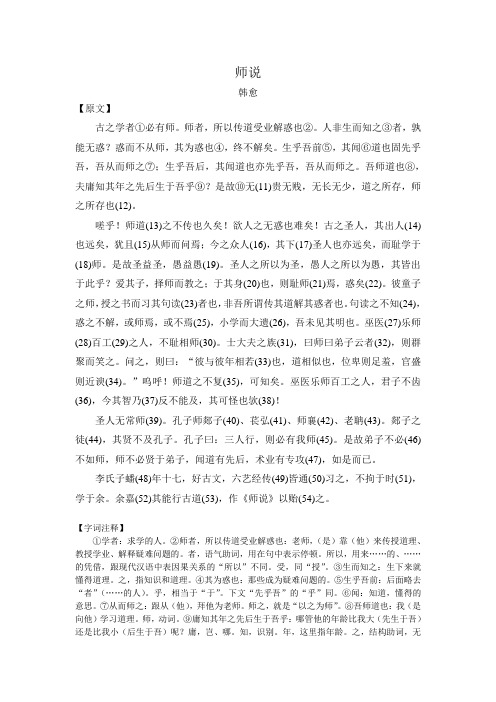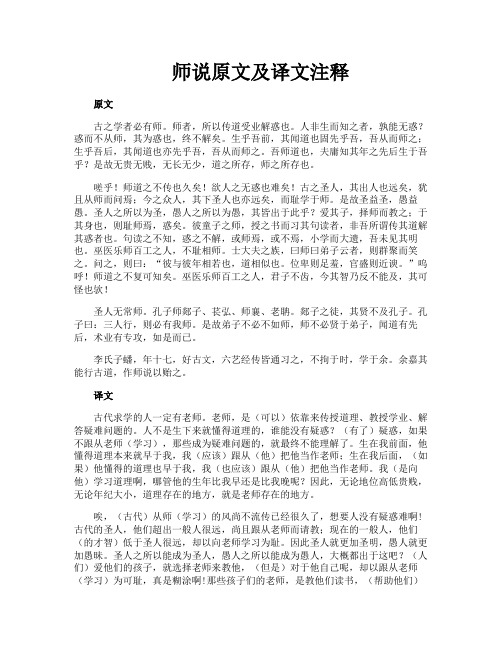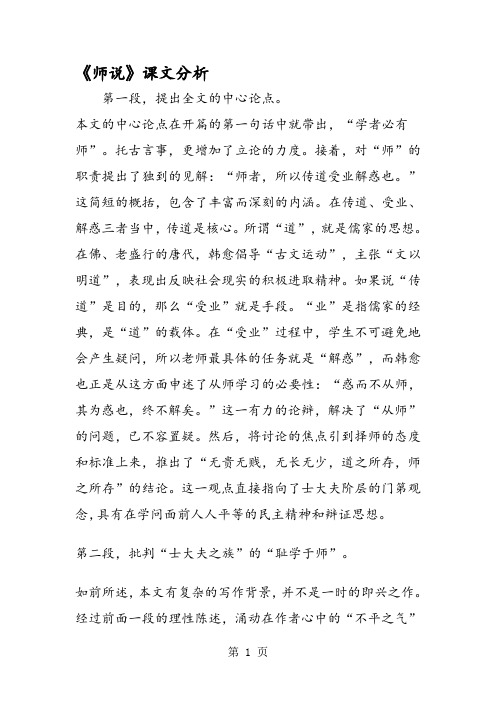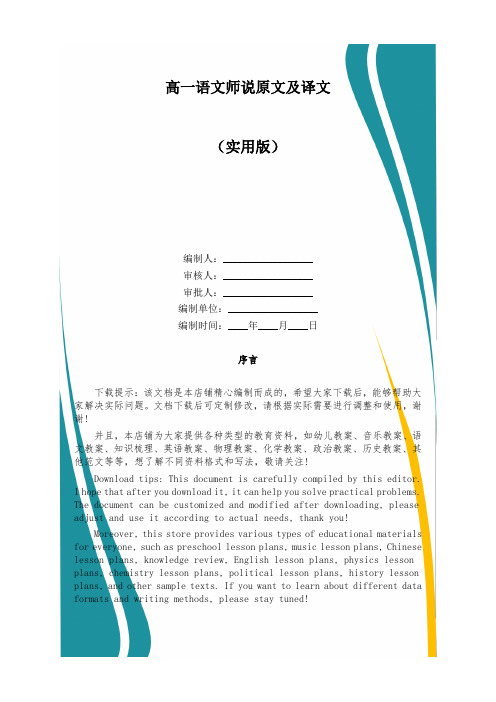师说课文讲解
《师说》原文及注解

师说韩愈【原文】古之学者①必有师。
师者,所以传道受业解惑也②。
人非生而知之③者,孰能无惑?惑而不从师,其为惑也④,终不解矣。
生乎吾前⑤,其闻⑥道也固先乎吾,吾从而师之⑦;生乎吾后,其闻道也亦先乎吾,吾从而师之。
吾师道也⑧,夫庸知其年之先后生于吾乎⑨?是故⑩无(11)贵无贱,无长无少,道之所存,师之所存也(12)。
嗟乎!师道(13)之不传也久矣!欲人之无惑也难矣!古之圣人,其出人(14)也远矣,犹且(15)从师而问焉;今之众人(16),其下(17)圣人也亦远矣,而耻学于(18)师。
是故圣益圣,愚益愚(19)。
圣人之所以为圣,愚人之所以为愚,其皆出于此乎?爱其子,择师而教之;于其身(20)也,则耻师(21)焉,惑矣(22)。
彼童子之师,授之书而习其句读(23)者也,非吾所谓传其道解其惑者也。
句读之不知(24),惑之不解,或师焉,或不焉(25),小学而大遗(26),吾未见其明也。
巫医(27)乐师(28)百工(29)之人,不耻相师(30)。
士大夫之族(31),曰师曰弟子云者(32),则群聚而笑之。
问之,则曰:“彼与彼年相若(33)也,道相似也,位卑则足羞,官盛则近谀(34)。
”呜呼!师道之不复(35),可知矣。
巫医乐师百工之人,君子不齿(36),今其智乃(37)反不能及,其可怪也欤(38)!圣人无常师(39)。
孔子师郯子(40)、苌弘(41)、师襄(42)、老聃(43)。
郯子之徒(44),其贤不及孔子。
孔子曰:三人行,则必有我师(45)。
是故弟子不必(46)不如师,师不必贤于弟子,闻道有先后,术业有专攻(47),如是而已。
李氏子蟠(48)年十七,好古文,六艺经传(49)皆通(50)习之,不拘于时(51),学于余。
余嘉(52)其能行古道(53),作《师说》以贻(54)之。
【字词注释】①学者:求学的人。
②师者,所以传道受业解惑也:老师,(是)靠(他)来传授道理、教授学业、解释疑难问题的。
者,语气助词,用在句中表示停顿。
师说原文及译文注释

师说原文及译文注释原文古之学者必有师。
师者,所以传道受业解惑也。
人非生而知之者,孰能无惑?惑而不从师,其为惑也,终不解矣。
生乎吾前,其闻道也固先乎吾,吾从而师之;生乎吾后,其闻道也亦先乎吾,吾从而师之。
吾师道也,夫庸知其年之先后生于吾乎?是故无贵无贱,无长无少,道之所存,师之所存也。
嗟乎!师道之不传也久矣!欲人之无惑也难矣!古之圣人,其出人也远矣,犹且从师而问焉;今之众人,其下圣人也亦远矣,而耻学于师。
是故圣益圣,愚益愚。
圣人之所以为圣,愚人之所以为愚,其皆出于此乎?爱其子,择师而教之;于其身也,则耻师焉,惑矣。
彼童子之师,授之书而习其句读者,非吾所谓传其道解其惑者也。
句读之不知,惑之不解,或师焉,或不焉,小学而大遗,吾未见其明也。
巫医乐师百工之人,不耻相师。
士大夫之族,曰师曰弟子云者,则群聚而笑之。
问之,则曰:“彼与彼年相若也,道相似也。
位卑则足羞,官盛则近谀。
”呜呼!师道之不复可知矣。
巫医乐师百工之人,君子不齿,今其智乃反不能及,其可怪也欤!圣人无常师。
孔子师郯子、苌弘、师襄、老聃。
郯子之徒,其贤不及孔子。
孔子曰:三人行,则必有我师。
是故弟子不必不如师,师不必贤于弟子,闻道有先后,术业有专攻,如是而已。
李氏子蟠,年十七,好古文,六艺经传皆通习之,不拘于时,学于余。
余嘉其能行古道,作师说以贻之。
译文古代求学的人一定有老师。
老师,是(可以)依靠来传授道理、教授学业、解答疑难问题的。
人不是生下来就懂得道理的,谁能没有疑惑?(有了)疑惑,如果不跟从老师(学习),那些成为疑难问题的,就最终不能理解了。
生在我前面,他懂得道理本来就早于我,我(应该)跟从(他)把他当作老师;生在我后面,(如果)他懂得的道理也早于我,我(也应该)跟从(他)把他当作老师。
我(是向他)学习道理啊,哪管他的生年比我早还是比我晚呢?因此,无论地位高低贵贱,无论年纪大小,道理存在的地方,就是老师存在的地方。
唉,(古代)从师(学习)的风尚不流传已经很久了,想要人没有疑惑难啊!古代的圣人,他们超出一般人很远,尚且跟从老师而请教;现在的一般人,他们(的才智)低于圣人很远,却以向老师学习为耻。
《师说》原文及译文

《师说》原文古之学者必有师。
师者,所以传道受业解惑也。
人非生而知之者,孰能无惑?惑而不从师,其为惑也,终不解矣。
生乎吾前,其闻道也固先乎吾,吾从而师之;生乎吾后,其闻道也亦先乎吾,吾从而师之。
吾师道也,夫庸知其年之先后生于吾乎?是故无贵无贱,无长无少,道之所存,师之所存也。
嗟乎!师道之不传也久矣!欲人之无惑也难矣!古之圣人,其出人也远矣,犹且从师而问焉;今之众人,其下圣人也亦远矣,而耻学于师。
是故圣益圣,愚益愚;圣人之所以为圣,愚人之所以为愚,其皆出于此乎!爱其子,择师而教之,于其身也,则耻师焉,惑矣!彼童子之师,授之书而习其句读者,非吾所谓传其道解其惑者也。
句读之不知,惑之不解,或师焉,或不焉,小学而大遗,吾未见其明也。
巫医乐师百工之人,不耻相师;士大夫之族,曰师曰弟子云者,则群聚而笑之。
问之,则曰:“彼与彼年相若也,道相似也。
位卑则足羞,官盛则近谀。
”呜呼!师道之不复可知矣。
巫医乐师百工之人,君子不齿。
今其智乃反不能及,其可怪也欤!圣人无常师。
孔子师郯子、苌弘、师襄、老聃。
郯子之徒,其贤不及孔子。
孔子曰:“三人行,则必有我师”是故弟子不必不如师,师不必贤于弟子。
闻道有先后,术业有专攻,如是而已。
李氏子蟠,年十七,好古文,六艺经传,皆通习之,不拘于时,学于余。
余嘉其能行古道,作《师说》以贻之。
《师说》译文古人求学的人一定有老师。
老师是传授道理,传授学业,解释疑难的人。
人不是生下来就懂得道理的谁能没有疑惑?有疑惑而不从师学习,那他对于疑惑的问题,就始终不能解决。
出生比我早的人,他闻知道道理本来比我早,我跟从他向他学习;比我出生迟的人,他闻知道道理如果也比我早,我也跟从他学习,而且把当作老师,我学习的是道理,哪里计较他生年比我早还是晚呢?所以,不论地位显贵还是地位低下,不论年长年少,道理存在的地方,也是老师存在的地方。
唉!从师学道的道理没人传布已经很久了,要人们没有疑惑很难哪!古代的圣人,他们超过一般人很远了,而且跟从老师向老师请教;现在的许多人,他们跟圣人相比相差很远了,却以向老师学为羞耻。
《师说》课文详解B4版

《师说》课文详解一、作者简介 韩愈(768—824),字退之,唐河阳人。
自称“祖籍昌黎”,故世称韩昌黎;因最后官至吏部侍郎,故又称韩吏部;卒谥“文”,故后世又称他为韩文公。
唐代著名散文家和诗人,“古文运动”倡导者。
文学,主张和创作实践,对后世有深远影响,后世称韩、柳和宋代的欧阳修、苏洵、苏轼、苏辙、曾巩、王安石为唐宋八大家。
古之学者..(求学的人)必.(一定)有师。
师者.(语气助词),所以..(固定用来结构…的)传道受.(同“授”)业解惑.(疑难问题)也。
古时候求学的人一定要有老师。
老师,是靠他来传授道理、讲授学业、解释疑难问题的。
人非生而.(表承接,却。
)知之.(代道理和知识)者,孰.(代词,谁)能无惑? 惑而.(表转折)不从师..(跟从老师), 人不是生下来就懂得道理, 谁能没有疑难问题呢? 有了疑难问题却又不向老师请教,其.(那些)为惑也.(句中语气,表舒缓),终.(终究)不解矣.(语气助词)。
生乎.(介词,在)吾前,那些成为疑难的问题, 就始终得不到解决。
出生在我之前的, 其.(代“吾前生乎”者)闻道..(得知真理)也(句中语气,表舒缓)固.(本来)先乎.(于,比)吾,吾从.(跟着追随)而.(表顺接,并且)师之..(以之为师); 如果他得知真理本来就比我早, 我跟从他,拜他为老师;生乎吾后, 其闻道也亦.(也)先乎吾,吾从而师之。
吾师道..(以道,即为师学道)也, 出生在我之后的,如果他得知真理也比我早, 我跟从他,拜他为老师。
我是向他学习道理的,夫.(句首语气助词)庸.(岂,难道)知其年.(这里指生年。
)之先后生于吾乎? 是故(因此所以)无贵无贱,无长无少, 那里用得着知道他的年龄比我大还是小呢? 因此无论高贵,无论低贱,无论年长,不论年少, 道之所存(存在的地方。
),师之所存也。
道存在的地方, 就是老师存在的地方。
第1段,提出中心论题,并以教师的职能作用总论从师的重要性和择师的标准。
师说的原文及注释

师说的原文及注释师说的原文及注释《师说》(唐)韩愈【原文】古之学者必有师。
师者,所以传道、受业、解惑也。
人非生而知之者,孰能无惑?惑而不从师,其为惑也,终不解矣。
生乎吾前,其闻道也固先乎吾,吾从而师之;生乎吾后,其闻道也亦先乎吾,吾从而师之。
吾师道也,夫庸知其年之先后生于吾乎?是故无贵无贱,无长无少,道之所存,师之所存也。
嗟乎!师道之不传也久矣!欲人之无惑也难矣!古之圣人,其出人也远矣,犹且从师而问焉;今之众人,其下圣人也亦远矣,而耻学于师。
是故圣益圣,愚益愚;圣人之所以为圣,愚人之所以为愚,其皆出于此乎!爱其子,择师而教之,于其身也,则耻师焉,惑矣!彼童子之师,授之书而习其句读者,非吾所谓传其道解其惑者也。
句读之不知,惑之不解,或师焉,或不焉,小学而大遗,吾未见其明也。
巫医乐师百工之人,不耻相师;士大夫之族,曰师曰弟子云者,则群聚而笑之。
问之,则曰:“彼与彼年相若也,道相似也。
位卑则足羞,官盛则近谀。
”呜呼!师道之不复可知矣。
巫医乐师百工之人,君子不齿。
今其智乃反不能及,其可怪也欤!圣人无常师。
孔子师郯子、苌弘、师襄、老聃。
郯子之徒,其贤不及孔子。
孔子曰:“三人行,则必有我师。
”是故弟子不必不如师,师不必贤于弟子。
闻道有先后,术业有专攻,如是而已。
李氏子蟠,年十七,好古文,六艺经传,皆通习之,不拘于时,学于余。
余嘉其能行古道,作《师说》以贻之。
【注释】[1]学者:求学的人。
[2]道:指儒家孔子、孟轲的哲学、政治等原理、原则。
可以参看本书上面所选韩愈《原道》。
[3]受:通“授”.[4]业:泛指古代经、史、诸子之学及古文写作,可以参看本书下面所选韩愈《进学解》中所述作者治学内容。
[5]人非生而知之者:语本《论语·述而》:“子曰:‘我非生而知之者,好古敏以求之者也。
’” 《论语·季氏》:“孔子曰:‘生而知之者,上也;学而知之者,次也。
’”孔子承认有生而知之的人,但认为自己并非这样。
(最新整理)《师说》原文及注解

《师说》原文及注解编辑整理:尊敬的读者朋友们:这里是精品文档编辑中心,本文档内容是由我和我的同事精心编辑整理后发布的,发布之前我们对文中内容进行仔细校对,但是难免会有疏漏的地方,但是任然希望(《师说》原文及注解)的内容能够给您的工作和学习带来便利。
同时也真诚的希望收到您的建议和反馈,这将是我们进步的源泉,前进的动力。
本文可编辑可修改,如果觉得对您有帮助请收藏以便随时查阅,最后祝您生活愉快业绩进步,以下为《师说》原文及注解的全部内容。
师说韩愈【原文】古之学者①必有师。
师者,所以传道受业解惑也②。
人非生而知之③者,孰能无惑?惑而不从师,其为惑也④,终不解矣。
生乎吾前⑤,其闻⑥道也固先乎吾,吾从而师之⑦;生乎吾后,其闻道也亦先乎吾,吾从而师之。
吾师道也⑧,夫庸知其年之先后生于吾乎⑨?是故⑩无(11)贵无贱,无长无少,道之所存,师之所存也(12).嗟乎!师道(13)之不传也久矣!欲人之无惑也难矣!古之圣人,其出人(14)也远矣,犹且(15)从师而问焉;今之众人(16),其下(17)圣人也亦远矣,而耻学于(18)师.是故圣益圣,愚益愚(19)。
圣人之所以为圣,愚人之所以为愚,其皆出于此乎?爱其子,择师而教之;于其身(20)也,则耻师(21)焉,惑矣(22)。
彼童子之师,授之书而习其句读(23)者也,非吾所谓传其道解其惑者也.句读之不知(24),惑之不解,或师焉,或不焉(25),小学而大遗(26),吾未见其明也。
巫医(27)乐师(28)百工(29)之人,不耻相师(30)。
士大夫之族(31),曰师曰弟子云者(32),则群聚而笑之.问之,则曰:“彼与彼年相若(33)也,道相似也,位卑则足羞,官盛则近谀(34)。
”呜呼!师道之不复(35),可知矣。
巫医乐师百工之人,君子不齿(36),今其智乃(37)反不能及,其可怪也欤(38)!圣人无常师(39)。
孔子师郯子(40)、苌弘(41)、师襄(42)、老聃(43)。
郯子之徒(44),其贤不及孔子。
《师说》课文分析

《师说》课文分析第一段,提出全文的中心论点。
本文的中心论点在开篇的第一句话中就带出,“学者必有师”。
托古言事,更增加了立论的力度。
接着,对“师”的职责提出了独到的见解:“师者,所以传道受业解惑也。
”这简短的概括,包含了丰富而深刻的内涵。
在传道、受业、解惑三者当中,传道是核心。
所谓“道”,就是儒家的思想。
在佛、老盛行的唐代,韩愈倡导“古文运动”,主张“文以明道”,表现出反映社会现实的积极进取精神。
如果说“传道”是目的,那么“受业”就是手段。
“业”是指儒家的经典,是“道”的载体。
在“受业”过程中,学生不可避免地会产生疑问,所以老师最具体的任务就是“解惑”,而韩愈也正是从这方面申述了从师学习的必要性:“惑而不从师,其为惑也,终不解矣。
”这一有力的论辩,解决了“从师”的问题,已不容置疑。
然后,将讨论的焦点引到择师的态度和标准上来,推出了“无贵无贱,无长无少,道之所存,师之所存”的结论。
这一观点直接指向了士大夫阶层的门第观念,具有在学问面前人人平等的民主精神和辩证思想。
第二段,批判“士大夫之族”的“耻学于师”。
如前所述,本文有复杂的写作背景,并不是一时的即兴之作。
经过前面一段的理性陈述,涌动在作者心中的“不平之气”终于一吐为快。
第二段以感叹发端,携着批判的锋芒,如暴风骤雨,涤荡乾坤,令人耳目一新。
“师道”唯其失传“久矣”,则今日扭转世风更难。
作者运用了三组对比,将论述的重点转移到批判现实中来。
先以“古之圣人”比照“今之众人”,得出了“圣益圣,愚益愚”的结论;再以择师教子和自身“耻师焉”作对比,得出了“小学而大遗”的结论;最后将“巫医乐师百工之人”和“士大夫之族”的学习态度进行对比,揭示了尊卑贵贱和智力高下成反比的奇怪现象,发人深思。
第三段,援引圣人从师的态度,进一步阐述师道、师生关系。
这一段的开头语气又归于和缓、理智,在平易中道出“圣人无常师”的事实。
虽然论述文字很少,但十分有力。
无论是举实事,还是引言谈,都能令人心服。
高一语文师说原文及译文

高一语文师说原文及译文(实用版)编制人:__________________审核人:__________________审批人:__________________编制单位:__________________编制时间:____年____月____日序言下载提示:该文档是本店铺精心编制而成的,希望大家下载后,能够帮助大家解决实际问题。
文档下载后可定制修改,请根据实际需要进行调整和使用,谢谢!并且,本店铺为大家提供各种类型的教育资料,如幼儿教案、音乐教案、语文教案、知识梳理、英语教案、物理教案、化学教案、政治教案、历史教案、其他范文等等,想了解不同资料格式和写法,敬请关注!Download tips: This document is carefully compiled by this editor.I hope that after you download it, it can help you solve practical problems. The document can be customized and modified after downloading, please adjust and use it according to actual needs, thank you!Moreover, this store provides various types of educational materials for everyone, such as preschool lesson plans, music lesson plans, Chinese lesson plans, knowledge review, English lesson plans, physics lesson plans, chemistry lesson plans, political lesson plans, history lesson plans, and other sample texts. If you want to learn about different data formats and writing methods, please stay tuned!高一语文师说原文及译文本店铺为各位同学整理了《高一语文师说原文及译文》,希望对你的学习有所帮助!1.原文篇一古之学者必有师。
- 1、下载文档前请自行甄别文档内容的完整性,平台不提供额外的编辑、内容补充、找答案等附加服务。
- 2、"仅部分预览"的文档,不可在线预览部分如存在完整性等问题,可反馈申请退款(可完整预览的文档不适用该条件!)。
- 3、如文档侵犯您的权益,请联系客服反馈,我们会尽快为您处理(人工客服工作时间:9:00-18:30)。
《师说》是唐代大散文家韩愈所作的一篇有名的说理文。
文章写在公元八百零三年,这时韩愈虽然才三十五岁,官职也不很高,但是他在文坛上已经有了名望,他所倡导的“古文运动”也已经开展起来。
韩愈为了能使古文运动得到更好的开展,他不仅自己从理论到实践刻苦努力,而且广泛地同青年后学交往,给他们具体的指导和帮助。
韩愈的这种作为,是六朝以来长期所没有的,因而人们往往引为怪事,以至纷纷议论和责难,指责他好为人师。
但是韩愈处在这样的环境中,仍然无所畏惧,继续为开展古文运动而努力。
柳宗元在《答韦中立论师道书》中说:“由魏晋氏以下,人盖不事师。
今之世不闻有师,有辄讥笑之以为狂人。
独韩愈奋不顾流俗犯笑侮,收召后学,作《师说》,因抗颜而为师。
”可见韩愈写这篇文章,是为了纠正当时社会上不重视求师学习的不良风气,也是对那些诽谤者的一个公开的答复和严正的驳斥。
文章一开始,作者就强调了从师的重要性,论述了为什么要从师和从什么人为师的道理。
这里所说的“古之学者”,不仅指古代作学生的青少年,也包括古时有志于学问的成年人。
文章论述老师的基本任务是:传道、授业、解惑。
“传道”,就是传授儒家的道统;“授业”,就是讲授古文“六艺”之业,“解惑”,就是解释对前两者的疑惑。
韩愈认为人不是生下来就什么都懂得的,谁都不可能没有疑惑,因此谁都不能没有老师;如果有了疑惑而不向老师请教,那末疑惑也就不可能得到解决。
什么人可以为师呢?他说:比我年长的人,比我先懂得道,我可以拜他为师;比我年轻的人,也比我先懂得道,我也可以拜他为师。
我所要学的是“道”,哪用得着去管他们的年纪是比我大还是小呢?所以,不管是社会地位高的“贵人”或者是社会地位低的普通人,不论是老年人还是年轻人,只要他懂得“道”,就可以拜他为老师,向他学习。
韩愈拿“道”的有无作为选择老师的唯一标准,认为只要合乎这点,地位高低、年龄大小都可以不必考虑。
这一段主要是从理论上提出论题,是全篇所要论证和宣扬的中心思想所在。
下文都是根据这一论题所作的具体阐发。
第二段,作者就拿上面讲的理论来批判当时人们不重视师道的不良风尚。
作者先以感叹语气,惋惜古人优良的从师风气没有能够流传下来,底下就连分三层用对比的方法来写。
第一层,作者以“古之圣人”与“今之众人”作对比。
古代圣人具有过人之才,尚且拜师求教,虚心学习;而现在有许多人的才智跟圣人相差很远,却反而以向别人学习为可耻。
他指出:圣人的所以具有聪明才智,愚人的所以愚昧无知,这种分野的根本关键,就在于他们能不能尊师重道,虚心学习。
文章在肯定了尊师重道的必要性以后,第二层就深入一步揭露有些人对待师道的错误态度。
这一层,把为子弟选择老师跟自己不愿拜老师作对比。
批评有些人为子弟选择老师,自己却耻于从师。
同时指出那些子弟的老师,也只是教人句读,并不能够尽到“传道”、“授业”、“解惑”的职责。
学习句读要拜人为师,而大道茫惑不解,却不愿拜人为师,他认为这种人小的学了,大的丢了,实在看不出有什么高明的地方。
这一段的第三层,作者又以“巫医乐师百工之人”与“士大夫之族”作对比,来批判当时士大夫们的不能尊师重道。
巫医乐师百工这些下层社会的人都不以拜师学习为可耻,而士大夫们一听到人家说老师弟子的事情就聚拢来嗤笑人家。
问他们为什么?他们说,那个做老师的和学生的年纪差不多,道术也差不多啊!这些人认为:向社会地位低的人学习是很羞耻的,而向官位显盛的学习又显得有点阿谀奉迎。
这样,师道的不能恢复,其原因也就可想而知了。
巫医乐师百工等人,社会地位低下,是士大夫们认为不足挂齿的,然而现在这些士大夫们的聪明才智却反而不如他们了,这实在是一种奇怪的现象!这一层,作者把师道之不振,完全归咎于当时的士大夫们,说他们的聪明才智,实在连巫医乐师百工等普通人都不如!这里一连三层,都列举事实进行对比,有力地批判了当时士大夫们不能尊师重道的愚蠢,表露了作者对这种不良风尚的愤懑情绪。
和文章第一段的总的论题相对照,可以明显地看出文章步步深入展开。
第三段,文章又转入正面阐述,以当时人们奉为至高无上的大圣人孔子的言行作证,来说明人必有师,人们应该多方面地向别人学习,而老师和学生也只是相对而言的。
郯子、苌弘、师襄、老聃都是春秋时代的学者,传说孔子曾经向郯子请教官职的名称,向苌弘访问古乐,向师襄学习弹琴,向老聃学习周礼。
这些人的贤能,在总的方面都远不及孔子,而孔子尚且愿意向他们学习,这说明孔子是很善于学习的。
他说的“三人行,必有我师焉”,是一句意义深长的名言。
韩愈在这里拿孔子的言行作为例子,主要在于说明不一定自己不如别人才向别人学习,鼓励人们应该虚心好学。
他认为学生不一定都不如老师,老师也不一定什么都比学生高明,只是他们闻道先后的不同,术业有专攻不专攻的区别罢了。
最后一小段,简要地说明本文写作的原因是:十七岁的李蟠,儒家的主要经典著作都已学过,他没有被时下的不良风尚所束缚,现在又来我这里求学,我赞赏他的能行古道,所以作这篇《师说》送给他。
总起来看,《师说》的中心思想,着重在论述师道的重要性,严正地驳斥士大夫们的恶意诽谤,抨击时俗轻视师道的不良风尚,为开展古文运动扫除思想障碍。
作者在本文中所发表的如何求学的见解是极其精辟的。
他对于读书求学的议论,很能够启发后人。
《师说》所提出的关于师道的主要思想是:师是“传道”、“授业”、“解惑”的人;任何人都可以为师,不应该因为地位、贵贱、年龄的差别,就不肯虚心向人学习。
韩愈在当时的社会环境中能提出这样的见解是很有胆识的,他对当时“士大夫之族”耻于相师的不良风气,确乎起了挽救和校正的作用。
韩愈所谓“师者,所以传道、授业、解惑也”,这个“道”虽然具体指的是儒家之道,但在一千多年前,韩愈就能提出“弟子不必不如师,师不必贤于弟子”的说法,也是很有魄力的。
他把老师和学生的关系,归结为“闻道有先后,术业有专攻”,提倡师生教学相长,这也确实可以鼓舞大家相互学习的风气。
《师说》这篇文章在写作上是非常成功的。
首先,它具有高度的说服力。
这固然和作者所提出的理论的正确性有关系,但是和作者采用了较好的说理方法也是分不开的。
韩愈这篇文章的主要目的,在于论述师道的必要性,批判士大夫们不能尊师重道的不良风尚。
整篇文章从立论、论证到结论,都紧紧扣住这一点,有的放矢,理论联系实际。
文章开头第一段,先正面从理论上阐述师道的重要性,并提出选择老师的标准,作为全篇文章的基本论题。
接着第二段,就联系到当时的社会实际,连用三层笔墨,一层深一层地揭露和批判当时人们对待师道的错误态度。
这三层文字,作者抓住了它们内在的本质联系,步步开展,有理论,有事实,有分析。
文章反复起伏,好象剥笋,剥了一层又一层,越剥越深,越说越透,又如海涛,一浪推动一浪,起伏不断,直到最后把问题的本质核心完全揭露无遗。
最后第三段,又归结到从正面作结论。
举出孔子的言论行动作为例子,目的也在于加强结论的说服力量。
整篇文章从虚到实,又从实到虚,正、反、合三大段文字,有破有立,虚实结合得很好。
文章谈理论,却不是空发议论;举事实,也不是现象罗列。
因此文章不蔓不支,很有说服力。
第二,这篇文章写得非常有气势。
韩愈的散文,在风格上具有雄健明快、汪洋恣肆的特色,这是古今研究韩愈散文的人所一致公认的。
北宋的苏洵,评他的文章如“长江大河,浑浩流转”。
《师说》在风格上也表现了这种特色,气势异常充沛,形成韩愈散文这种风格的因素当然很多,但是就《师说》来看,作者根据内容的需要,在语言上善于创造性地运用排偶的句式,是具有一定的作用的。
什么叫排偶的句式呢?那就是把范围相同、性质相近的事物,采用结构相同或相类似的句式接连在一起来表达。
这种句式如果运用得好,它可以有助于增加文章的气势,使文章如波浪滚滚,汹涌不绝。
《师说》里的排偶句式很多,例如:“生乎吾前,其闻道也,固先乎吾,吾从而师之;生乎吾后,其闻道也,亦先乎吾,吾从而师之。
……是故无贵无贱,无长无少,道之所存,师之所存也。
”这种排偶语句,使人读起来不仅感到气势很盛,而且有一种音节的美,在语气上很自然流畅,它跟骈体文雕琢堆砌的排偶不同,所以常为后来许多写散文的人所运用。
第三,《师说》整篇文章写得都很好,尤其是第二段写得更为精彩动人。
这一段开始,未说先叹:“嗟乎,师道之不传也久矣,欲人之无惑也难矣!”这两句,乍看起来并没有什么出奇,然而联系上段来看,就显得非常有力。
因为文章到这里出现了一个转折,它使文章掀起了一道波澜,避免了平板和呆滞。
这两句往下,作者一连安排了三层对比,来对士大夫们不重视师道的愚蠢行为进行批评和讽刺,笔端饱含着感情,真可说嘻笑怒骂,淋漓尽致!这段文章在语言运用上的错综多变,表现得也非常突出。
例如连用三个对比,每个对比的结尾都指出当时不重视师道的人的愚蠢,但所用的语气都不一样。
请看作者把“古之圣人”和“今之众人”对比之后的结语:“圣人之所以为圣,愚人之所以为愚,其皆出于此乎?”这个结语带有质疑、设问和论辩的味道,非常发人深思。
再看作者拿为子弟择师与自己不愿从师对之后的结语:“小学而大遗,吾未见其明也。
”这个结语就完全是下判断的肯定语气,说得斩钉截铁,毫不含糊。
最后,以巫医乐师百工和士大夫作对比后的结语:“巫医乐师百工之人,君子不齿。
今其智乃反不能及,其可怪也欤!”这个结语就采用了感叹的语气,富有感情色彩,它不仅表露了作者的不满情绪,而且显示出对他所批判的论敌的鄙夷和蔑视。
这三个结语采用了三种不同的语调,在次序的安排上也是颇有匠心的:先疑问,后肯定,再感叹。
这样,不仅文气很顺,而且也增强了文章论辩的逻辑力量。
此外,《师说》在句式和语言的错综变化方面,可供我们细细琢磨和借鉴的地方很多,比如第一段开始,作者即创造性地采用接句法:“古之学者必有师。
师者,所以传道、授业、解惑也。
”第二句句首的“师”字和第一句末尾的“师”字紧接着。
往下:“人非生而知之者,孰能无惑?惑而不从师,其为惑也,终不解矣。
”第二个“惑”字也是紧接着前一句末尾的“惑”字而来。
其他如“固先乎吾,吾从而师之”,“亦先乎吾,吾从而师之”,也都是采用的接句法。
这种句法,也有助于加强文章的气势,使文气急转直下,不可抑止。
又如第二段中的交错句式,运用得也很好:“句读之不知,惑之不解,或师焉,或不焉。
”这种句式奇突而不一般化。
我们如果把它改写为直叙句:“句读之不知,则师焉;惑之不解,则不焉。
”显然就变得比较平淡而没有原来那样有力了。
再如这同一段中:“彼与彼,年相若也,道相似也。
”直接采用士夫大们对话的口吻来写,它不仅表明了士大夫们对从师计较年龄地位的错误态度,而且从这里可以看到他们的神情。
文章直接引用他们的原话以后,紧接着“位卑则足羞,官盛则近谀”两句,便立刻改用作者对士大夫们的言行进行评述的口吻来写,使两种不同的态度,针锋相对。
这也是本文运用语言善于错综变化的很好例子。
